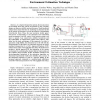ICRA
2010
IEEE
13 years 10 months ago
2010
IEEE
— An online intention recognition algorithm for computer-assisted teleoperation is introduced. The algorithm is able to distinguish between phases of a typical object manipulatio...
ICRA
2010
IEEE
13 years 10 months ago
2010
IEEE
— Allowing robots to communicate naturally with humans is a major goal for social robotics. Most approaches have focused on building high-level probabilistic cognitive models. Ho...
ICRA
2010
IEEE
13 years 10 months ago
2010
IEEE
ICRA
2010
IEEE
13 years 10 months ago
2010
IEEE
— We present adaptive admittance control of a robotic manipulator, with uncertain dynamic parameters, operating in a constrained task space. To provide compliance to external for...
ICRA
2010
IEEE
13 years 10 months ago
2010
IEEE
— Soft robotic systems have applications in industrial, medical, and security applications. Many applications require these robots to be small and lightweight. One challenge in d...
ICRA
2010
IEEE
13 years 10 months ago
2010
IEEE
— Our prior work [1] presented a decentralized algorithm for coordinating the construction of a truss structure out of multiple components. In this paper, we discuss adaptation i...
ICRA
2010
IEEE
13 years 10 months ago
2010
IEEE
— Although robot navigation in indoor environments has achieved great success, robots are unable to fully navigate these spaces without the ability to operate elevators, includin...
ICRA
2010
IEEE
13 years 10 months ago
2010
IEEE
— In a haptic teleoperation system, the incorporation of knowledge about the remote environment in the controller design can improve stability and performance. Model-mediated tel...
ICRA
2010
IEEE
13 years 10 months ago
2010
IEEE
— This paper presents a soft robotic platform that exhibits peristaltic locomotion. The design principle is based on the unique antagonistic arrangement of radial/circular and lo...
ICRA
2010
IEEE
13 years 10 months ago
2010
IEEE
Abstract— Gait evaluation techniques that use Stokes’s theorem to integrate a system’s equations of motion have traditionally been limited to finding only the net rotations ...




